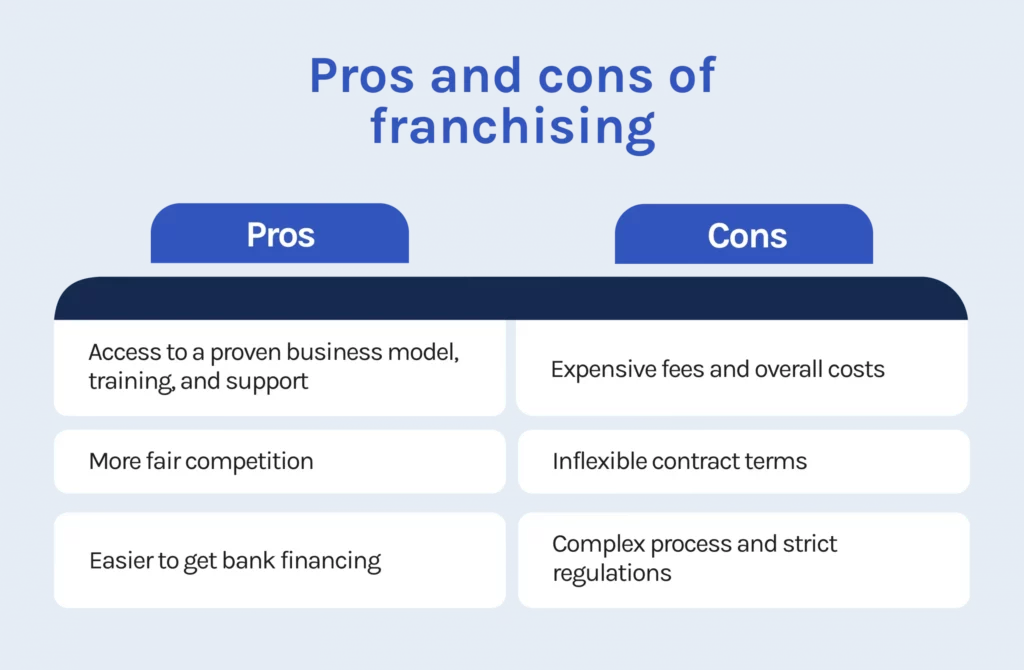(Video Length: 0:0:55)

What is franchising and how does it work?
Franchising occurs when an independent business owner opens one or more locations of an existing business by purchasing the brand rights from the company.
When buying a franchise, a franchisee will have access to the business plan, trade secrets (such as recipes), marketing materials, and the right to operate under the main company’s name in exchange for agreeing to certain terms.
Although purchasing a franchise sounds like a no-brainer, franchising is not made for everyone. Opening a franchise can bring great benefits, but also involves risks that can threaten your business venture.
Before entering a franchise, we created a list of advantages and disadvantages so you can weigh your options:
Pros of buying a franchise business

1. Proven business model
Crafting a business plan requires expertise and making costly mistakes. But once you buy a franchise, you will benefit from using a business plan that has been tested to be effective, so you just have to take care of implementing a procedure that works.
2. Brand recognition and customer base
When starting a business, you have to build your brand and a customer base, which is a process that can take plenty of time.
On the other hand, if you open a franchise, you already have a built-in reputation, so there is a much higher probability that people already know your brand and the products and services you provide. By owning a business that is already positioned in the market, you are able to attract customers from day one and begin to generate profits.
3. Access to business support
One of the pros of franchises is that the assistance provided by the franchisor makes it not necessary for you to have an extensive experience in the industry. An overall business management knowledge is enough for you to be capable of owning a profitable franchise, since the franchisor will ensure you understand their business model and operations.
The assets that you receive from the franchisor will depend on the terms of the Franchise Agreement. It varies whether the franchisees receive equipment, supplies, and the advertising plan. Still, it is for sure you will receive business assistance to guide you through the process of operating a business.
4. Easier access to financing
Because franchising fees are significantly high, the biggest challenge for franchisees is being able to get the financial resources for their investment. However, franchises have an advantage over other business ventures in this matter.
Some franchisors provide loans and financing options for franchisees, but they can have high-interest rates. Nevertheless, franchisees can resort to other financial options. Since franchises are considered less risky investments than other business ventures, it is more probable that banks and lenders are willing to finance your franchise business.
As a startup, meeting the eligibility requirements for an SBA loan can be very difficult. However, for those interested in a franchise business, the SBA has a reserved portion of their loan allotment specifically for franchises. You can even check the SBA Franchise Directory to see if the franchising company you\’re interested in appears here.
5. Collective buying power
Being part of an extensive network is a big advantage that can be reflected in the costs of your supplies and the materials you need to run your business.
The franchisor has an already established relationship with suppliers, so you will no longer have to look for a trustworthy distributor. Furthermore, the economies of scale work in franchises\’ favor, for they are able to purchase a huge amount of goods at a lower price and, this way, benefit each of their locations.
6. Access to technology and equipment
Franchisors give their franchisees all the intel they need regarding technology and equipment. Franchisees will know which CRM, apps or other software to use to stay organized and manage their business more easily.
Similarly, you will know which equipment is the best for your daily operations and will even receive training to ensure you are using it to its full potential.
Cons of Buying a franchise business
1. High costs
The main disadvantage of buying a franchise is the considerably high start-up costs. To start a franchise, franchisees need to pay a unique franchise fee but added to that, they have to invest in setting up the business and other expenses the franchisor may require, such as marketing costs and management fees.
2. Restricting regulations
Franchises do not offer the same flexibility as startups, since you cannot make any modifications to the business model, the products and services you offer, or even the design and layout of the physical location. Franchisees are not entirely in control of their business, for they cannot make decisions without the previous permission of the franchisor.
Not abiding by the restrictions stated in the Franchise Agreement can bring severe consequences for the franchisee. This is why franchises are not meant for those business owners who want to innovate and manage their businesses in their own way.
3. Franchise royalties and ongoing investment
As a hefty initial fee wasn’t enough, you will owe a portion of your monthly revenue to the franchisor for the life of your business. You will also have to spend on technology upgrades, rebranding, store redesigns, or any requirement the franchisor imposes.
4. Lack of financial privacy
Your financial information will be shared with the franchisor as a way to improve the franchise’s business model and audit royalty payments. However, the bright side is that you can receive guidance if you are facing financial issues.
5. Franchise reputation can affect you
The brand recognition of a franchise can be a double-edged sword. If a location is a victim of the scandal, it is likely that the entire franchise will have a negative impact on your business.
6. Potential for conflict
Buying a franchise can bring serious conflict, especially when business owners are not aware of their rights and responsibilities as franchisees. There may be various misunderstandings regarding the payment of royalties, the extent of support the franchisor will provide, or the regulations that must be followed. Also, it is key that franchisees notice that contracts are not permanent, for the time frame of ownership is limited and may not be renewed.
Not fully understanding and abiding by the rules that are stipulated in the Franchise Disclosure Document (FDD) can not only make you lose your business but get into serious legal issues.
Opening a franchise depends on several factors, such as the extent of risk you are willing to accept, the economic position you are in, and how much you care for your financial and entrepreneurial independence.
Before entering a franchising business, make sure you have proper professional guidance, such as that from an accountant and a franchise attorney.


